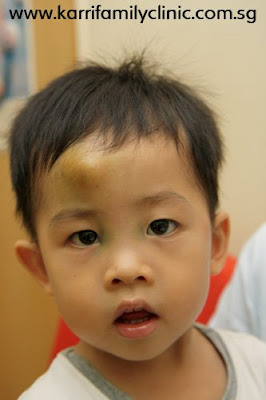
Prof Chay Oh Moh, Chairman, Division of Medicine, KKH delivering the lecture on New Guidelines and Treatment Options in the Asthma Management of Children
I had the opportunity to attend the first seminar and workshop last Saturday in order to get updated on the latest developments in paediatric asthma care and managed to meet with the specialists and the nursing staff there.
This programme is an important step in the development of Asthma care in Singapore. Despite being a country with one of the best healthcare in the world, Singapore has the third highest rate of Asthma deaths after Russia and Uzbekistan. Having received my medical education from Australia, where one in four children suffer from Asthma, I am very familiar with the well developed system of Asthma care there. Compared to them, we still have much room for improvement, which is why we are keen to support KKH in their push for better Asthma Care in Singapore.
As a Partner of the KKH Asthma Care program, Karri Family Clinic is committed to:
- Embrace the practice of evidence-based care in accordance with practice guidelines
- Participate in regular CME programmes organised by KKH
- A two-way sharing of medical information on integrated care patients
- Our clinic will be able to communicate with your KKH specialist concerning the management of your child's asthma.
- When required, we will be able to Fast Track your appointment at KKH so you don't have to wait for weeks for your first appointment.
- Our clinic will be able to directly admit your child to KKH without having to go through the Children's Emergency Dept.
- Your child will continue to be enrolled in the Asthma Club, ie patient support group after discharge from KKH
- Direct referral for skin prick testing
- Priority access to KKH Pulmonary lab for Lung Function Tests
- Be able to send our patients to KKH for patient education programmes
You can read about the KKH partners in Asthma care program here

Dr Jenny Tang, Head of the Respiratory Medical Service demonstrating the use of spacer devices
Remember that good Asthma control means that the child will not have any wheeze or cough and be able to be active in sports without ever getting short of breath. In other words, an Asthmatic child will be like any other child except for the fact that they might need to take some medications. This is the gold standard for Asthma care and it is achievable.
With this new partnership, we now have additional resources to help our patients achieve good Asthma control.
To read my other articles on Asthma, please click here






















